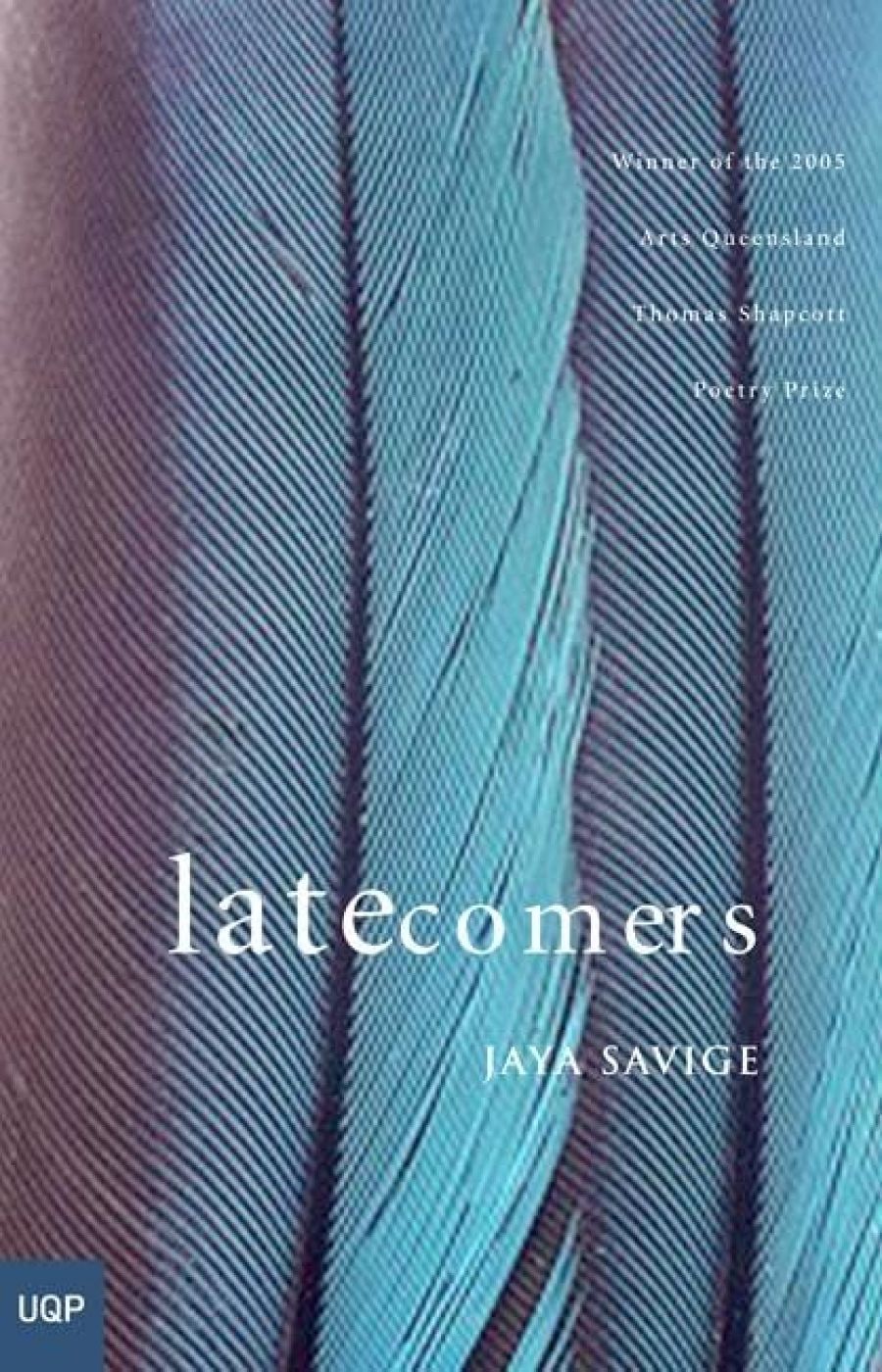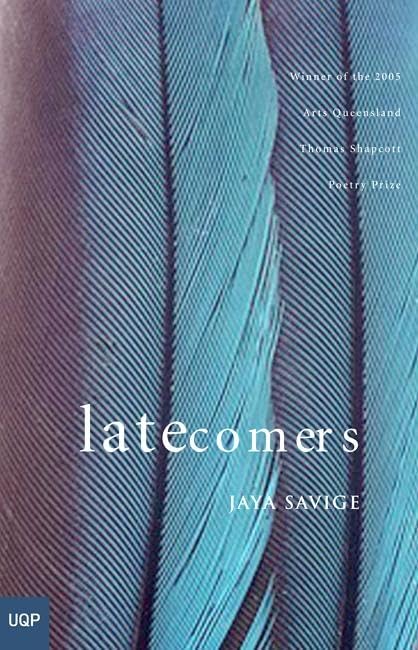
- Free Article: No
- Contents Category: Poetry
- Review Article: Yes
- Article Title: A larger view
- Online Only: No
- Custom Highlight Text:
The poems collected in Jaya Savige’s first book, latecomers (published by UQP as winner of the 2004 Arts Queensland Thomas Shapcott Poetry Prize), are often marvels in their own right – street-savvy, sensitive, intelligent lyrics. Together, even more impressively, they generate a many-branched, collective meditation on lateness.
- Book 1 Title: Latecomers
- Book 1 Biblio: UQP, $22.95 pb, 84 pp, 0702235199
- Book 1 Cover Small (400 x 600):

- Book 1 Cover (800 x 1200):

The first and briefest of the book’s three sections, ‘The Unofficial History Pavilion’, looks at various topics – love, war and the needs that sustain them, life and death in the natural world, the role of the media in this one – but everything here involves time. Perhaps in keeping with the theme of lateness, we’re not actually welcomed to the ‘Pavilion’ until we’re about to leave, ‘heavy with a hundred smouldering cares’ (‘New Year’s Day 1239’), having just ‘arrived’ in the previous poem ‘as the sun was sinking / into the quicksand of the suburbs’. Shortly before, with ‘the moon … barely a souvenir’ (‘Souvenir’), time had come to a sickening halt in the ‘frozen landscape’ of ‘The Partisan’, and prior to that, in ‘Catch You Later’, a debate had taken place between the poet – ‘I thought I arrived late’ – and his sister, who’s ‘not in the mood // for anachronisms, like yesterday / & now. So the future it is …’ Maybe. But as we go back even further, time turns historical in unexpected ways – ‘Tonight you resemble a star’, one lover tells another: ‘I see you as you were / many years ago’ (‘Odometer’) – and also expands in the space between lovers, ‘forming a microclimate’ or ‘pause’: ‘she crawls through the hollow log / and finds time there’ (‘A Place for the Rain’). The opening poem, ‘Desires Are Already Memories’, about a ‘scarab mid-hegira / from its burning island home’, contemplates endurance in time, beyond death.
Much of the second section, ‘Skirmish Point’, is focused on Bribie Island (Yarun), Savige’s home, ‘where a tree grows / up through a car / abandoned during the war’ (‘Void If Removed’). History is pervasive here, and some of it is more or less official. The opening poem, ‘Hamartia’, which buttonholes the reader with ‘simulated strafing exercises’ and missed understandings – ‘They thought our Wirraways were Zeros’ – is, like the archaeology of the island, littered with remnants of World War II. We’ll later learn that kids play among them ‘in acres of bladey-grass’, ‘to the north of the island, near the old artillery battery’ (‘The Metal Detectors’).
Further in, or deeper down, the poem for which this section is named gives a moving but analytical account of the belated exchange system that Matthew Flinders introduced to the inhabitants: ‘He took the dilly, but couldn’t relinquish his hat, / & so a spear sailed over the gunwale; / the musket succeeded on the third attempt.’
Elsewhere, Savige proves deft at evoking the island’s sensual and pacific aspects: ‘beyond the bay window / a jumble of undulant breasts’ (‘Settlement’). But even when these poems describe, for example, a leisurely breakfast – one whose spin-off is a life-determining web of intrigue involving a human, ‘next-door’s cat’, ‘a largish ant’, ‘four varieties of flies’, ‘a spider’, some Christmas beetles, ‘chewed cockroaches’, more ants and ‘the sun’s warm paws’ – an undercurrent of violence haunts them. Small matters of survival. Wars. Only one detail – ‘the sticky reveille’ of some syrup hitting ‘a spun leaf’ – links this poem (‘The Master of Small Violences’) to ‘the ghosts of soldiers’ in ‘Brennan park’, but the link, once established, sends out tendrils to include today’s news and the means of its delivery: ‘the antique holocaust’ that ‘breaks over / the head of my tv’ in ‘Salute the New Prospero’, its presiding spirit a ‘broken Ariel’ ‘weeping / waves of radio tears’, while ‘out in the backyard blackhawks flex in circles / preparing for the president’.
Whence our present predicament, the future – ‘proof pending of interminable autumn’, to cite section three, ‘As Though We Were Never Here’. Formally and stylistically diverse, this section contemplates issues of responsibility. The first poem, ‘Mercedes’ (‘latin for reward’), is about a girl who is ‘trying to find her mother’ and ‘says her mother will kill her’. We don’t actually see the poet give this girl the cigarette she asks for, only his complicity when she ‘returns with a handful of ashes’. Mothers and murder return, too. Savige’s own mother appears, pirouetting ‘into an Arnhem bar / like an exotic cocktail / no-one’s ever thought to order’ (‘Currency Lad’), and her absence – ‘she has died’ (‘Sunshine Coast Exit’) – becomes palpable, as do the poet’s mixed feelings as he considers, for example, ‘those / microscopic creatures that must / eat their way out of their own mother’ (‘Mandarin’).
Some poems celebrate the advent amid friends, families and lovers of ‘a kind of peace / between us, a late gift we give to each other / in silence’ (‘Silent Night’). But after silence comes sleep, and dreams – ‘a cross between // the sting / and the proboscis’ of ‘night / that black wasp’ (‘Fast Asleep’). In a ten-part sequence, ‘The Dreamworld Murders’, Savige explores a specific dream in which he finds himself responsible for murder: ‘in the red house across the road: / a family of raw meat.’ ‘Intercession’ (for the dead) follows, but in many ways ‘The Dreamworld Murders’ ties the book together. The protagonist of ‘The Master of Small Violences’, contemplating the ants in his sink, had decided: ‘it is the day drowns them, he is blameless.’ The irony survives in the later poem, but as part of a larger view.


Comments powered by CComment